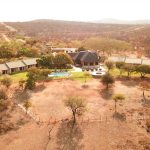GLOBAL #CLIMATE STRIKE
Climate Profile: Kimber Jacobs, a matric student using social media as a tool for climate activism

Kimber Jacobs, a matric student from Wynberg Girls High School, says social media is an important tool for young climate activists to connect and share information, personal stories and environmental protest updates from around the world.
“Seeing environmental activism on social media helped shape my mentality and make me more environmentally conscious,” Jacobs told Daily Maverick in an interview with young climate activists from the African Climate Alliance last week.
Jacobs, along with thousands of school children and young people across the world, will post her involvement in the Friday 20 September #ClimateStrike on social media. Jacobs says she uses social media to find environmentally friendly products that will not break her budget.
“With the plastic straw issue, I saw some of my friends had bought cheap metal straws. Before, I had only seen them in stores being advertised for R130 or R150 or even more,” Jacobs explained. But she did not have to buy one, because a little while later her mother came home and presented her with five metal straws provided by the company her mother works for.
“It was impressive. Businesses are taking action. Well, some of them,” said Jacobs, laughing.
Overall, social media has significantly impacted on the way Jacobs interacts with the environment. Although she does not use social media platforms as primary sources of news and information, she does get regular updates on environmental issues around the world.
“Recently, when I saw the Amazon fires on social media I sat down with my parents and told them that we really need to start rethinking how we consume meat in the house, and work towards more meat-free and environmentally friendly meals without compromising our nutrition and health, and also our budget.”
Like many young climate activists, Jacobs lives at home with her parents and is completing high school. She does not have control over the groceries and necessities bought for her household and can’t force her parents to buy environmentally friendly products. Culturally, she also does not feel she has the authority to tell older people in her extended family and community how to live.
“The way adults react really depends on how they view you as a human, rather than how they view you as a child or a young person,” said Jacobs
Since speaking to her parents and laying out the facts, Jacobs has seen a noticeable shift in her family’s approach to the climate crisis.
“My sister was the first person to come home and say that we need to start recycling, and my parents were like, “what? That’s crazy”. But now it’s come such a far way. We have huge bins of recycling and my dad is always taking it off to the recycling place,” said Jacobs of her parents’ first introduction to environmental activism.
She recently found her mother looking up vegan meals for under R100. While her parents have made a concerted effort to change their lifestyle, Jacobs does not think their willingness to change is reflected around the country.
In response to whether the South African government is doing enough to battle the ongoing climate crisis, Jacobs responded with a resounding “no”.
“The reason I say that is because enough will be enough when this is no longer a problem. It is still a problem. It’s crazy that we still have Medupi and Kusile power stations that are overspilling in debt with Eskom because of how much money has gone into producing such an unsustainable project. That is just such a prime example of how late we are to the party.”
Jacobs says the declaration of a climate emergency would mean countrywide mobilisation and awareness campaigns. She would want the government to incorporate affirmative action campaigns for those most affected by climate if a climate emergency is formally declared.
“The most extreme aspects of climate change that I see is litter on the beach, or experiencing weather changes. Declaring a climate emergency would tell people that just because the climate crisis is impacting people in another province or another city, doesn’t mean you can detach yourself from it because we are all part of the problem.”
Jacobs believes that people with privilege, in particular people living in cities and metros who are not directly affected by climate change, should speak out and use their privilege to amplify the voices of marginalised communities who have already experienced the negative effects of climate change.
“With our smartphones and our social media accounts, we can get the message out there. And we are the people who have the ability and the opportunity to get to the protest to put pressure on the government to make them wake up and realise that this is a priority. They need to focus on the areas most impacted by the crisis, and it’s our responsibility to make sure they do.” DM





















 Become an Insider
Become an Insider